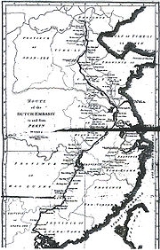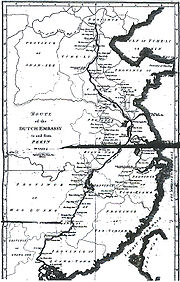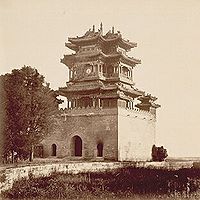
Chrétien-Louis-Joseph de Guignes
Encyclopedia
Chrétien-Louis-Joseph de Guignes (1759–1845) was a French
merchant
-trader, ambassador
and scholar. He was the son of French academician and sinologue, Joseph de Guignes
. He learned Chinese from his father, and then traveled to China
where he stayed for the next 17 years and returned to France in 1801.
, the Dutch ambassador to the court of the Qianlong Emperor
of China.
 Titsingh travelled to Peking (Beijing) for celebrations of the sixtieth anniversary of the Emperor's reign. The Titsingh delegation also included the Dutch-American Andreas Everardus van Braam Houckgeest
Titsingh travelled to Peking (Beijing) for celebrations of the sixtieth anniversary of the Emperor's reign. The Titsingh delegation also included the Dutch-American Andreas Everardus van Braam Houckgeest
, whose description of this embassy to the Chinese court were soon published in the U.S. and Europe. In the year following the emperor's rebuff to the British mission
headed by Lord George Macartney
, Titsingh and his colleagues were much feted by the Chinese because of what was construed as seemly compliance with conventional court etiquette. The members of the Titsingh mission, including de Guignes, were the last European diplomats to savour the mid-winter splendor of the vast Summer Palace (the Yuangmingyuan
, now known as Old Summer Palace) before its destruction by the Lord Elgin's troops during the punitive Second Opium War in 1860. In 1808, de Guignes published his account of the Titsingh mission, which provided an alternate perspective and a useful counterpoint to other reports which were then circulating. Neither the Europeans nor the Chinese could have known that the Titsingh embassy would turn out to have been the last occasion in which any European appeared before the Chinese Court within the context of traditional Chinese imperial foreign relations.
In 1808, de Guignes published his account of the Titsingh mission, which provided an alternate perspective and a useful counterpoint to other reports which were then circulating. Neither the Europeans nor the Chinese could have known that the Titsingh embassy would turn out to have been the last occasion in which any European appeared before the Chinese Court within the context of traditional Chinese imperial foreign relations.
friar
, Basilio Brollo of Gemona (1648-1704). While de Guignes had altered the original by arranging the characters according to the order of the 214 radicals (as contrasted with Basilio's tone-based order), the dictionary received strong criticism in 1814 from the first person to be appointed to be a professor of Chinese at a European institution of higher learning, Jean-Pierre Abel-Rémusat (1788-1832). Despite any controversy, de Guignes was elected a member of the Institut de France
in the Académie des Sciences (Géographie et Navigation) and of the Académie des Inscriptions et Belles-Lettres
.
France
The French Republic , The French Republic , The French Republic , (commonly known as France , is a unitary semi-presidential republic in Western Europe with several overseas territories and islands located on other continents and in the Indian, Pacific, and Atlantic oceans. Metropolitan France...
merchant
Merchant
A merchant is a businessperson who trades in commodities that were produced by others, in order to earn a profit.Merchants can be one of two types:# A wholesale merchant operates in the chain between producer and retail merchant...
-trader, ambassador
Ambassador
An ambassador is the highest ranking diplomat who represents a nation and is usually accredited to a foreign sovereign or government, or to an international organization....
and scholar. He was the son of French academician and sinologue, Joseph de Guignes
Joseph de Guignes
Joseph de Guignes , French orientalist and sinologist, was born at Pontoise, the son of Jean Louis de Guignes and Françoise Vaillant. He died in Paris....
. He learned Chinese from his father, and then traveled to China
China
Chinese civilization may refer to:* China for more general discussion of the country.* Chinese culture* Greater China, the transnational community of ethnic Chinese.* History of China* Sinosphere, the area historically affected by Chinese culture...
where he stayed for the next 17 years and returned to France in 1801.
At court of the Qianlong Emperor
In 1794-95, de Guignes served as interpreter for Isaac TitsinghIsaac Titsingh
Isaac Titsingh FRS was a Dutch surgeon, scholar, merchant-trader and ambassador.During a long career in East Asia, Titsingh was a senior official of the Dutch East India Company . He represented the European trading company in exclusive official contact with Tokugawa Japan...
, the Dutch ambassador to the court of the Qianlong Emperor
Qianlong Emperor
The Qianlong Emperor was the sixth emperor of the Manchu-led Qing Dynasty, and the fourth Qing emperor to rule over China proper. The fourth son of the Yongzheng Emperor, he reigned officially from 11 October 1735 to 8 February 1796...
of China.

Andreas Everardus van Braam Houckgeest
Andreas Everardus van Braam Houckgeest Dutch-American merchant who is mostly known for his participation in the last Dutch embassy to China under the tributary system.- Early career :...
, whose description of this embassy to the Chinese court were soon published in the U.S. and Europe. In the year following the emperor's rebuff to the British mission
Macartney Embassy
The Macartney Embassy, also called the Macartney Mission, was a British embassy to China in 1793. The Mission ran from 1792–94 . It is named for the first envoy of Great Britain to China, George Macartney, who led the endeavour...
headed by Lord George Macartney
George Macartney, 1st Earl Macartney
George Macartney, 1st Earl Macartney, KB was an Irish-born British statesman, colonial administrator and diplomat. He is often remembered for his observation following Britain's success in the Seven Years War and subsequent territorial expansion at the Treaty of Paris that Britain now controlled...
, Titsingh and his colleagues were much feted by the Chinese because of what was construed as seemly compliance with conventional court etiquette. The members of the Titsingh mission, including de Guignes, were the last European diplomats to savour the mid-winter splendor of the vast Summer Palace (the Yuangmingyuan
Old Summer Palace
The Old Summer Palace, known in China as Yuan Ming Yuan , and originally called the Imperial Gardens, was a complex of palaces and gardens in Beijing...
, now known as Old Summer Palace) before its destruction by the Lord Elgin's troops during the punitive Second Opium War in 1860.

Sinologist
In 1808, Napoleon ordered de Guignes to prepare of a Chinese-French-Latin dictionary. The work was completed five years later. Shortly after the publication, it was discovered that the dictionary was nothing more than a copy of an older work coposed by the FranciscanFranciscan
Most Franciscans are members of Roman Catholic religious orders founded by Saint Francis of Assisi. Besides Roman Catholic communities, there are also Old Catholic, Anglican, Lutheran, ecumenical and Non-denominational Franciscan communities....
friar
Friar
A friar is a member of one of the mendicant orders.-Friars and monks:...
, Basilio Brollo of Gemona (1648-1704). While de Guignes had altered the original by arranging the characters according to the order of the 214 radicals (as contrasted with Basilio's tone-based order), the dictionary received strong criticism in 1814 from the first person to be appointed to be a professor of Chinese at a European institution of higher learning, Jean-Pierre Abel-Rémusat (1788-1832). Despite any controversy, de Guignes was elected a member of the Institut de France
Institut de France
The Institut de France is a French learned society, grouping five académies, the most famous of which is the Académie française.The institute, located in Paris, manages approximately 1,000 foundations, as well as museums and chateaux open for visit. It also awards prizes and subsidies, which...
in the Académie des Sciences (Géographie et Navigation) and of the Académie des Inscriptions et Belles-Lettres
Académie des Inscriptions et Belles-Lettres
The Académie des Inscriptions et Belles-Lettres is a French learned society devoted to the humanities, founded in February 1663 as one of the five academies of the Institut de France.-History:...
.
Works
- de Guignes, C.-L.-J. (1813). Dictionnaire Chinois, Français et Latin, le Vocabulaire Chinois Latin. Paris: Imprimerie Impériale.
- ____________. (1808). Voyage a Pékin, Manille et l'Ile de France. Paris: Imprimerie Impériale.

